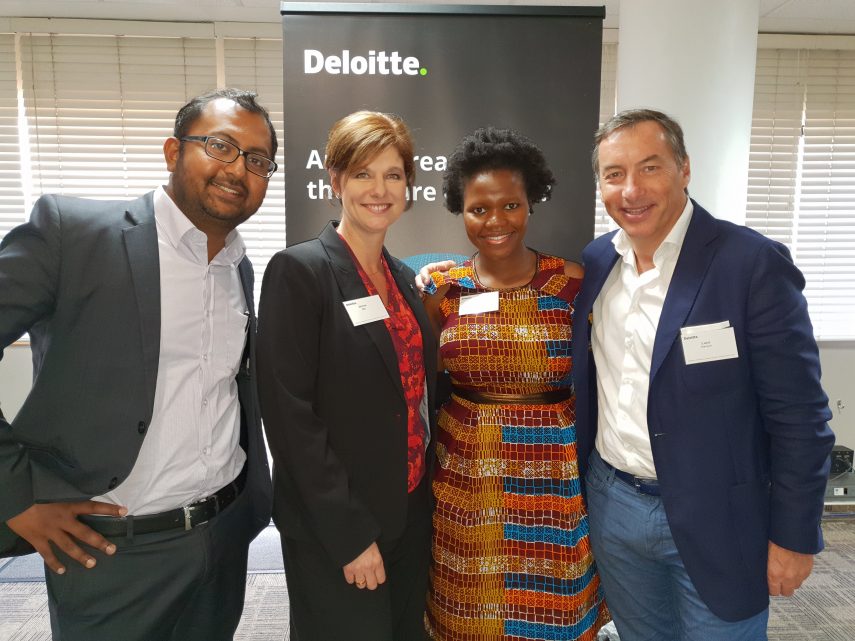THE world of work has changed dramatically in recent years and is poised for even more drastic disruption over the next five to seven years as technology continues to blur the line between digital and physical.
That was the message to emerge from a Future of Work event hosted by Deloitte in Durban recently, one that resonated strongly with the leaders of businesses present, who were drawn from sectors as diverse as agriculture, manufacturing, advertising and fast-moving consumer goods (FMCG).
Topics under the spotlight included the impact of automation and robotics, artificial intelligence (AI) and an increasingly dispersed, ‘gig economy’ workforce on organisations and society, as well as the growing importance of millennials in the workplace.
Luc-Olivier Marquette, CEO of Unilever South Africa tries out an augmented reality (AR) solution from Deloitte at a recent Future of Work event hosted by the leading professional services firm in Durban
“While some choose to focus on the negative narrative – job losses, disruption from more nimble start-ups, etc – we at Deloitte are tremendously optimistic about the Future of Work and we’re working with clients to avoid the pitfalls and seize upon the myriad of opportunities that are emerging,” said keynote speaker Arun Babu, Digital and Innovation Leader, Deloitte Consulting.
He cautioned, however, that this requires decisive leadership and a willingness to embrace digital age principles like agility and scalable learning. “While traditional business wisdom was to build scale, if you want to compete with today’s start-ups as a large corporation, you need to be able to learn at scale and implement those learnings almost instantaneously across your workforce so that everyone moves forward at the same pace,” Babu said.
Unilever South Africa CEO Luc-Olivier Marquet shared how the FMCG multinational was employing such principles and engaging with a new breed of digitally savvy consumer across the globe.
With millennials (the generation born between 1980 and the early 2000s) making up an increasingly influential slice of its customer base, he said Unilever has had to “totally re-invent” the way it markets its products to consumers who don’t watch television and have installed ad-blocking software on the web browsers.
It was also clear from the event that millennials, apart from making up a significant proportion of consumers, are a growing force to be reckoned with in the workplace.
Neliswa Fente from Springage by Deloitte, the firm’s millennial insights unit, said this generation was projected to make up 50 percent of the workforce by 2020 and this would increase by 75 percent by 2025. “Millenials are no longer on the fringes. They are parents, they are entrepreneurs and they are making decisions in your organisations.”
Fente said that against this background, Deloitte had taken the decision to tap into the talent, ambitions and potential of this generation with the creation of a Millennial Board. Comprising 14 of the firm’s most dynamic and promising young staff members, the Millennial Board is working with company leadership to evolve the firm’s innovation strategy.
So successful has the initiative proved, that Deloitte is now working with several clients to implement similar programmes.
Janine Nel, Leader for Organisation, Transformation and Talent at Deloitte Consulting, said the firm was working with organisations around the world, throughout the continent and across South Africa to help them to recalibrate talent, technology and workplaces.
“We’re aware that when it comes to the Future of Work, each workplace has its own unique requirements. For example, even within a multi-national corporation, you can’t simply transplant an approach that may work in the US or Europe to its South African operations,” Nel said.
With this in mind, Deloitte is developing highly customised solutions for clients in a number of key sectors, including mining, consumer business and financial services.
Several of these were on display at the Durban event, including a cellphone-based employee engagement platform, a chatbot and an augmented reality (AR) solution that uses Microsoft’s HoloLens technology.
“While automation and AI will undoubtedly have a profound impact, we at Deloitte believe that the future of work is very much about people. People empowered to do what they do best, thinking creatively, using emotional intelligence, making value judgements, communicating, teaching and sharing wisdom,” said Nel.

